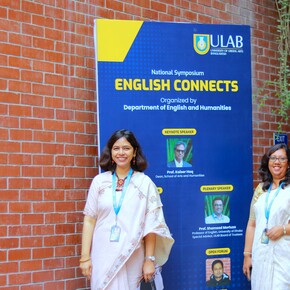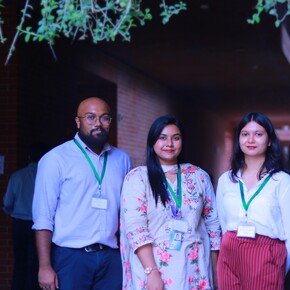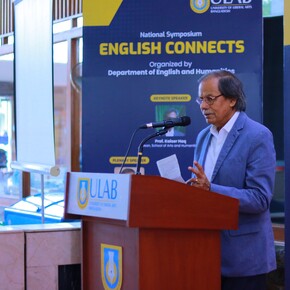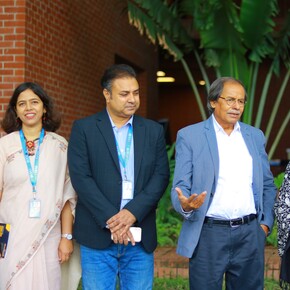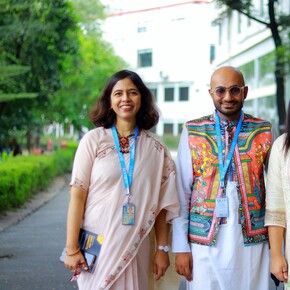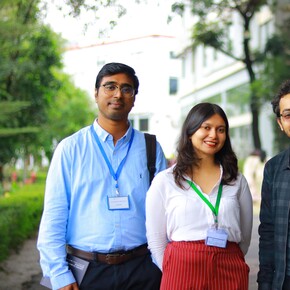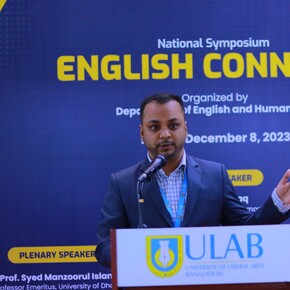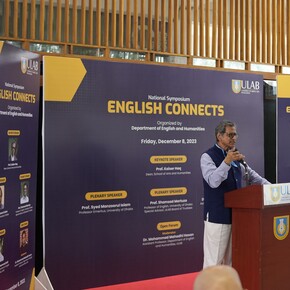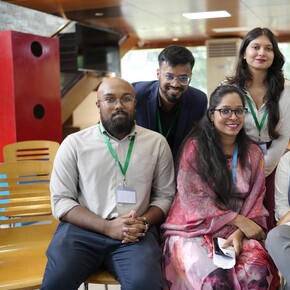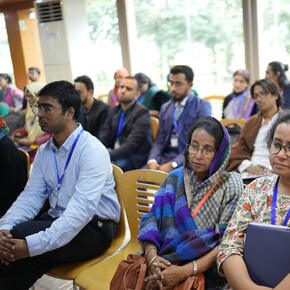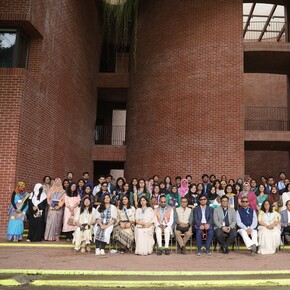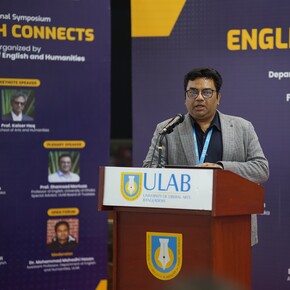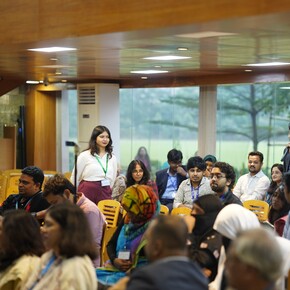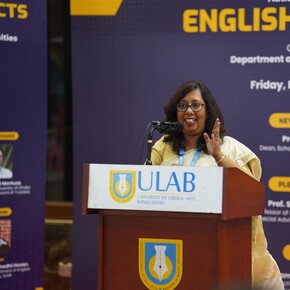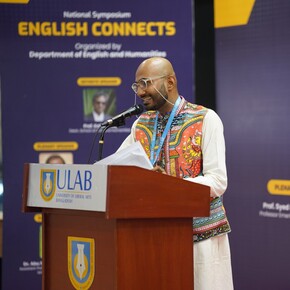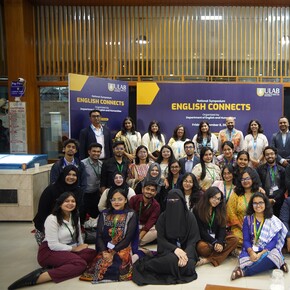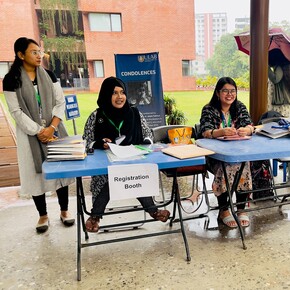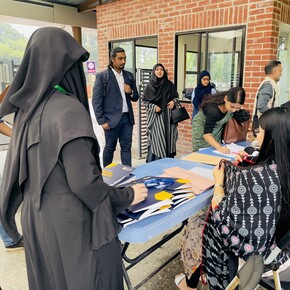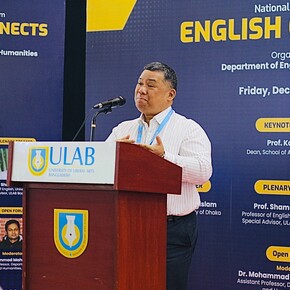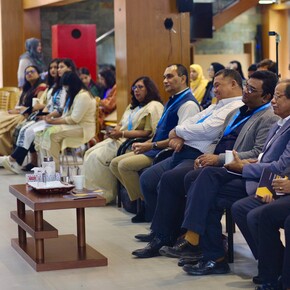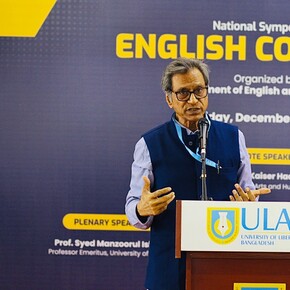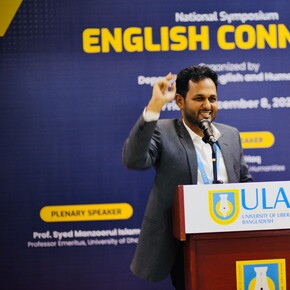DEH National Symposium: “English Connects”
The Department of English and Humanities at the University of Liberal Arts Bangladesh (ULAB) organized a one day National Symposium on the theme of “English Connects” on December 8, 2023,, where educators and students of English studies from educational institutions all around Bangladesh were welcomed to present their scholarly papers on diverse topics.
The event commenced at 9 am with warm greetings to the attendees by Ms. Arifa Ghani Rahman, Head and Associate Professor, DEH, ULAB. Afterward, Prof. Kaiser Haq, Dean of the School of Arts and Humanities at ULAB and Prof. Shamsad Mortuza, Special Advisor to the Board of Trustees of ULAB welcomed the audience and appreciated their scholarly participation in this symposium. The Symposium was then formally inaugurated by Prof. Jude William R. Genilo, Pro-Vice Chancellor of ULAB.
Professor Kaiser Haq, in his Keynote Address titled “Connecting the Dots,” shared his insights on how the practice of English had evolved in the educational sector after Bangladesh’s independence. He, then, read an excerpt from a book to explain the journey of world literature to its current state and explored the ability of the English language to reflect one’s culture and tradition. The Keynote provided a comprehensive study on the journey of English studies and how all the dots between different literatures in English can be connected.
The first plenary session, “English Studies in the Digital World: Restoring Human Connection,” was delivered by Professor Emeritus Syed Manzoorul Islam, University of Dhaka, who spoke about the paradigm shift of the eras from the classical to the “post-” and “-isms” in literature such as postmodernism, modernism, feminism, all of which symbolize plurality. He further elaborated on how English Studies allow both close and further readings, which can then let the theories produce reflective practices, encourage meaningful productions, and challenge established norms. The session concluded with the acknowledgment that the crux of AI is humanism, and using this, the inner workings of it can and will be further improved to be more emotionally intelligent and human-like.
In the second plenary session, Dr. Abu Saleh Mohammad Rafi, Assistant Professor, DEH, ULAB, explored the complexities of language that allows one to connect and disconnect in regards to colonizers. In his talk titled “Monolingual University Meets Multilingual Students: Connection, Disconnection and Translinguistic Fiesta,” he spoke about the traditional and ecological perspectives of language, and how one language does not inject into another. The speech also delved into the importance of the medium of instruction and how all institutions have decided to adopt a particular language for communication in classrooms. At present, the educational institutions are going back to adopting English which eventually disconnects the student from their own culture, which makes them incapable of connection at a global level and this can further alienate them.
The third plenary speaker, Prof. Shamsad Mortuza, Special Advisor to the ULAB Board of Trustees, spoke on the connection between language and historical and religious beliefs in a talk titled “Stories Beyond Armageddon: Rethinking Human and Nonhuman Interdependency.” He discussed the relationship between humans and machines, and how they control each other. However, Dr. Mortuza also acknowledged that though the technological advancements did not reach the human consciousness level, there might be possibilities of when the machines can parallel human emotions and creativity when proper training modules are created. He also explained the organic relation that is established between the teacher, student, and the textbook through the use of language as an essential medium of communication.
Dr. Mohammad Mahadhi Hassan, Assistant Professor, DEH, ULAB, and Symposium Coordinator moderated the open forum where he invited the presenters and participants of the Symposium to an open exchange of thoughts on how the practitioners as well as the students of English discipline can create a conducive environment in academia. Many in-depth thoughts were brought up and discussed such as the ability of language to connect people globally through social media trends and how English as a global language has allowed us to connect with authors from all over the world.
Two parallel sessions were held where 100 presenters from 24 universities, 8 schools, and colleges presented their papers on diverse topics of English studies. The sessions provided a unique opportunity for the presenters to exchange their vibrant insights and bridge the prevailing gaps in our compartmentalized education system.
The day-long conference was brought to its conclusion with closing remarks by Ms. Arifa Ghani Rahman, Head and Associate Professor, DEH, ULAB, and a shout-out to the student volunteers and faculty members from the Department of English and Humanities, ULAB for their unflinching support of the entire event.

